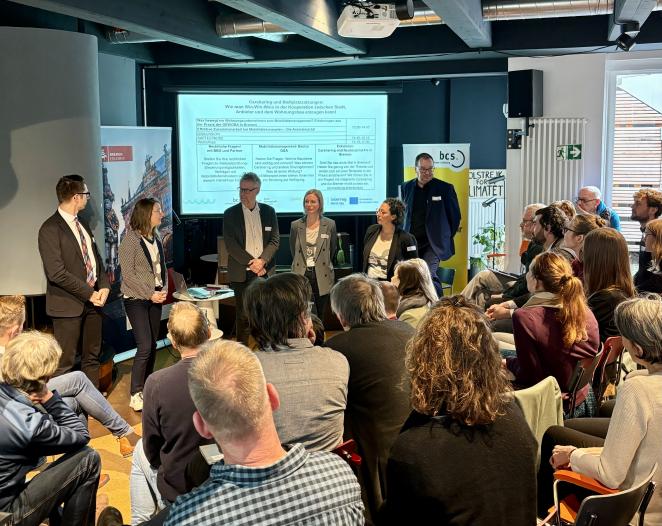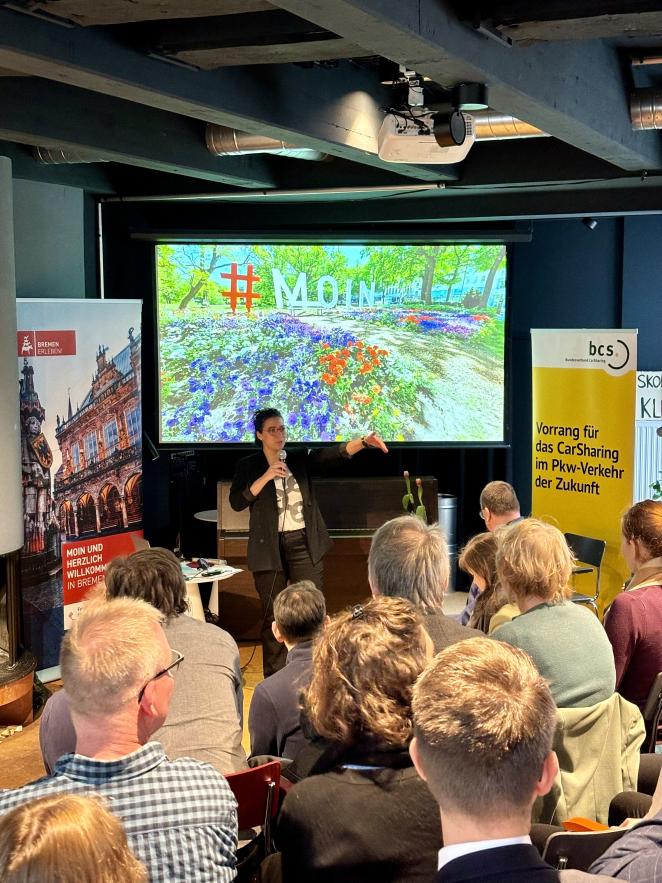Eighty participants from municipalities, the housing industry, and car-sharing providers responded to the invitation from the Federal Car Sharing Association (BCS) and the Free Hanseatic City of Bremen to attend the "Carsharing and Innovative Parking Bylaws in Real Estate Developments" conference on January 17, 2024, in Bremen. The event was sponsored by SHARE-North Squared - Growing shared mobility in housing developments and living as a service.

Various presentations highlighted how cities, NGOs and other actors promote and develop innovative parking regulations and mobility concepts in Germany. These innovative parking bylaws can significantly contribute to creating equitable cities of the future and freeing up space for people. Many stakeholders such as municipalities, carsharing providers, the housing industry, and residents all stand to benefit from this approach.
During this conference, representatives from the cities of Bremen and Rostock, Bremen’s social housing company GEWOBA as well as stadtmobil Rhein-Main GmbH introduced not only innovative parking regulations and bylaws, but also first-hand experiences from different implementation perspectives.

Here are the key insights at a glance:
1. Michael Ziesak, Transportation Policy Advisor at the German Federal CarSharing Association, emphasized the importance of planning carsharing stations during the early stages of new construction projects. Establishing sustainable mobility options successfully requires involving the expertise of mobility providers in municipal and housing development planning from the outset. Municipalities must play a guiding and coordinating role in this process to avoid situations that could lead to disappointment among all parties involved, including residents.
2. Next, the City of Bremen has had exemplary parking legislation since 2011. Rebecca Karbaumer and Wiebke Weltring from the Department of Strategic Transport Planning of the Free Hanseatic City of Bremen highlighted the experiences they have gathered over the years, particularly regarding changes in mobility behavior. Building on these experiences, the existing regulations were further developed in 2022 with the introduction of a Mobility Construction Site Act. A key element of this act is mandatory mobility management, which includes provisions for establishing carsharing stations, offering carsharing memberships, providing tenant and employee tickets, and implementing a communication strategy.
3. In 2017, the Hanseatic City of Rostock adopted a new parking regulation inspired by Bremen's example. Similarly, along the Baltic Sea coast, there is a focus on mobility concepts aimed at reducing the demand for cars and parking spaces among residents and users. Steffen Nozon, Head of the Department of Strategic Transport Planning and Mobility of the City of Rostock, presented the city's experiences to date in his talk, outlining how regulations and mobility concepts could be further developed in the coming years.
4. Not to forget, not only municipalities but also housing companies benefit from modern parking regulations and mobility management measures. In their report, Jörn Ehmke and Thomas Grabley from GEWOBA, the largest housing provider in the city of Bremen,outlined how the transition from car-centric cities to mobile cities can be successful and what needs to be considered, not only in new construction but also in existing areas. Not every mobility measure promises success—mobility concepts must be tailored individually based on the existing structures. As emphasized by all stakeholders, communication is of central importance throughout this process.
5. Finally, Bernd Kremer, Managing Director of the carsharing provider stadtmobil Rhein-Main GmbH from Frankfurt am Main, provided another insightful report. From the perspective of a service provider, parking regulations and mobility concepts are the right steps to implement carsharing in residential developments. Kremer emphasised not only the necessity for collaboration among all stakeholders in creating parking spaces but also in marketing efforts.
The event closed with two simultaneous well-attended workshops on legal questions led by Simon Kase, lawyer at BBG and Partner and “Experiences with One Year innovative Parking Bylaw in Bremen” led by Sarah König. And finally, shared mobility experts Michael Glotz-Richter and Wiebke Weltring led an excursion to experience first-hand a best practice implementation of a mobility concept based on innovative parking bylaws in Bremen.
Interested to read more: you can find the press release and presentations in German here.
